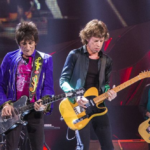 Our World
Our World  Our World
Our World  Miscellaneous
Miscellaneous 10 Intriguing Origins of Popular Carnival Rides
 Weird Stuff
Weird Stuff Ten Unexpected Discoveries Involving Vomit
 Movies and TV
Movies and TV 10 Actors Who Almost Didn’t Take Career-Defining Roles
 Technology
Technology 10 Little-Known Shifts in Computer Science
 Religion
Religion 10 Catholic Histories That Reveal Acceptance of Abortion and Contraception
 Politics
Politics 10 Lesser-Known “First and Only” Facts about U.S. Presidents
 Miscellaneous
Miscellaneous 10 Things You May Not Know about the Fourth of July
 History
History 10 Shocking and Gruesome Founding Father Facts They Don’t Teach in School
 Crime
Crime The Ten Most Vicious Los Angeles Killers
 Our World
Our World 10 Surprising Secrets of Notre Dame Cathedral
 Miscellaneous
Miscellaneous 10 Intriguing Origins of Popular Carnival Rides
 Weird Stuff
Weird Stuff Ten Unexpected Discoveries Involving Vomit
Who's Behind Listverse?

Jamie Frater
Head Editor
Jamie founded Listverse due to an insatiable desire to share fascinating, obscure, and bizarre facts. He has been a guest speaker on numerous national radio and television stations and is a five time published author.
More About Us Movies and TV
Movies and TV 10 Actors Who Almost Didn’t Take Career-Defining Roles
 Technology
Technology 10 Little-Known Shifts in Computer Science
 Religion
Religion 10 Catholic Histories That Reveal Acceptance of Abortion and Contraception
 Politics
Politics 10 Lesser-Known “First and Only” Facts about U.S. Presidents
 Miscellaneous
Miscellaneous 10 Things You May Not Know about the Fourth of July
 History
History 10 Shocking and Gruesome Founding Father Facts They Don’t Teach in School
 Crime
Crime The Ten Most Vicious Los Angeles Killers
10 Harmful Misconceptions about Gender and Sexuality
In the tapestry of our world, conversations about gender and sexuality are buzzing louder than ever. But let’s face it, some myths floating around could use a friendly debunking. This list is all about unpacking ten common misconceptions surrounding gender and sexuality. Buckle up for a journey of understanding as we tackle these myths head-on and aim for a more inclusive and open-minded dialogue.
Related: Top 10 Biggest Lies People Tell Every Day
10 Women Who Don’t Want Kids and Single Mothers Hold No Value
The misconception that women who choose not to have children or single mothers hold no value is not just outdated but also downright inaccurate. Let’s debunk this myth and shed light on these women’s societal contributions.
Firstly, choosing not to have children is a valid and personal decision. Women who opt for a child-free lifestyle often channel their time, energy, and resources into other pursuits that bring value to themselves and the community. They contribute to their careers, philanthropy, and personal growth, debunking the notion that motherhood defines a woman’s worth.
On the flip side, single mothers exhibit exceptional strength and resilience. Many successfully balance work, parenting, and personal development. Single mothers often contribute to the economy, breaking the stereotype that their status diminishes their value. Studies show that single mothers are more likely to pursue higher education and enter the workforce, becoming integral community members.
Recognizing that a woman’s value extends far beyond her family status is crucial. Embracing diverse choices and celebrating the unique contributions of women, whether child-free or single mothers, enriches our understanding of individual worth in our society.
9 Men Are Violent and Aggressive
The common stereotype that men are naturally violent and aggressive is a widespread misconception that deserves a second look. While it’s true that some individuals, regardless of gender, may display aggressive behavior, attributing it only to men oversimplifies a complex issue.
Research shows that aggression is not exclusive to one gender. In fact, studies indicate that women can be just as aggressive as men, though their expressions of aggression may differ. Factors such as upbringing, environment, and individual personality play a role in shaping behavior.
Men, like women, are diverse individuals with a broad range of emotions and personalities. Society’s expectations can sometimes encourage harmful stereotypes, leading to the misconception that men are prone to violence. However, many men actively reject these stereotypes and promote healthier expressions of masculinity.
Focusing on individual behavior rather than making sweeping generalizations is needed to break free from harmful assumptions. By acknowledging the diversity within the male population and challenging stereotypes, we can foster a more inclusive and understanding society that recognizes and appreciates the complexity of human behavior.
8 Without Traditional Gender Roles, Your Marriage Will Fail
In relationships, there’s a misconception that without following traditional gender roles, your marriage is destined for failure. However, let’s debunk this myth and embrace the beauty of equality in partnerships.
Successful marriages thrive on communication, understanding, and shared responsibilities rather than conforming to gender norms. Studies show couples engaging in open conversation and dividing tasks based on individual strengths often report higher relationship satisfaction.
Relationships are evolving to break free from the constraints of traditional gender roles. Both partners can contribute to household chores, decision-making, and family nurturing, fostering a more balanced and harmonious dynamic. This leads to a happier marriage and contributes to the overall well-being of the family unit.
Rigid stereotypes do not bind love and partnership. Embracing equality in marriage doesn’t spell doom. Instead, it paves the way for mutual growth, understanding, and a stronger bond between partners.
7 Men Are Naturally Better Leaders
The misconception that men are naturally better leaders is a stereotype that has persisted for centuries. While history portrays men in leadership roles, attributing leadership qualities solely to gender is both inaccurate and unfair. Leadership skills are not exclusive to any gender. Individual experiences, education, and personal development shape them.
Research challenges the notion that men are inherently superior leaders. Numerous studies indicate effective leadership is linked to communication, empathy, and strategic thinking. Diverse leadership teams, including men and women, have been shown to enhance organizational performance.
For example, a study by McKinsey & Company found that companies with more gender diversity in leadership positions are 21% more likely to outperform their counterparts. This shows that a mix of perspectives and skills, regardless of gender, leads to better decision-making and innovation.
Identifying and debunking such misconceptions is essential to foster a more inclusive and fair society. Embracing diverse leadership strengths, irrespective of gender, breaks down harmful stereotypes and paves the way for a more dynamic and successful future.
6 Hobbies Are Gendered
Hobbies are often unfairly associated with gender stereotypes, perpetuating the misconception that certain activities are exclusively for men or women. This belief restricts personal growth and supports outdated norms. In reality, hobbies should be a source of joy and self-expression, free from gender traditions.
Take, for instance, the perception that woodworking is a man’s domain while knitting is for women. This notion overlooks that both activities require creativity, patience, and skill. In fact, history shows us that men and women have excelled in various hobbies regardless of traditional expectations. Ada Lovelace, a trailblazing mathematician, is often regarded as the world’s first computer programmer, challenging the notion that tech-related hobbies are exclusively male pursuits.
The impact of these gendered hobby stereotypes goes beyond personal enjoyment. It can discourage individuals from exploring their interests and talents, limiting their potential. By debunking these misconceptions and embracing a more inclusive perspective on hobbies, we can foster a culture that encourages everyone to pursue their passions without gender barriers. After all, hobbies are about personal fulfillment, not conforming to societal expectations.
5 Being Bi or Pansexual Makes Cheating More Likely
Being bisexual or pansexual has nothing to do with a person’s likelihood of cheating. Let’s clear up this common misconception. Sexual orientation is about attraction, love, and connection—it’s not a predictor of someone’s fidelity.
Research shows that there’s no correlation between being bi or pansexual and an increased likelihood of cheating. Infidelity is a complex behavior influenced by various factors, but one’s sexual orientation isn’t one of them. People of all sexual orientations can be committed and loyal partners.
Studies indicate that communication, trust, and emotional connection are more significant factors in maintaining a faithful relationship than someone’s sexual orientation. Perpetuating stereotypes about bisexual or pansexual individuals adds to the stigma they might already face. Instead of making assumptions, focus on understanding and supporting each other in building healthy relationships.
4 Asexuality Is Only Caused by Sexual Trauma
Asexuality, the lack of sexual attraction to others, is a valid and natural orientation that exists independently of any traumatic experiences. One common misconception surrounding asexuality is the misguided belief that it is solely caused by sexual trauma.
Firstly, asexuality is a spectrum, just like any other sexual orientation. Some people may experience a complete lack of sexual attraction, while others may feel it to varying degrees. Importantly, these feelings are not linked to past traumatic events.
Research supports the notion that asexuality is a legitimate and innate orientation. Various studies have shown that asexual individuals, like their heterosexual, homosexual, or bisexual counterparts, exhibit diverse and complex romantic attractions. There is no evidence to suggest that trauma is a factor in one’s asexuality.
Assuming asexuality is a result of trauma perpetuates harmful stereotypes and overlooks the nature of human sexuality. It’s essential to approach discussions about sexual orientations with an open mind, acknowledging the validity of each individual’s experience.
3 A Person’s Sexuality Can Never Change
Sexuality is a complex and fluid aspect of human identity, and the misconception that a person’s sexuality can never change is rooted in outdated beliefs. Contrary to this, numerous studies and real-life experiences highlight the dynamic nature of sexuality.
Research has shown that sexual orientation can evolve. Individuals may discover new aspects of their attractions or find that their preferences shift as they navigate life. This is a normal part of human diversity. Additionally, societal attitudes and acceptance have evolved, allowing people to explore and express their true selves without fear of judgment.
A fact to consider is the understanding that sexuality is not solely determined by biology. It is a combination of biological, environmental, and psychological factors. As individuals grow and develop, their experiences and self-awareness can influence their sexual identity.
It’s crucial to debunk the myth that a person’s sexuality is set in stone. People have the autonomy to explore and understand their sexuality, which can foster a more inclusive and supportive society. By acknowledging the fluidity of sexuality, we can break free from stereotypes and promote an environment where individuals feel empowered to be authentic in their journey of self-discovery.
2 Gender Expression Matches a Person’s Gender and Sexuality
Gender expression, gender, and sexuality are often intertwined concepts. Still, it’s crucial to dispel the misconception that one’s gender expression always aligns with one’s gender identity or sexuality. Let’s break it down in simple terms.
Imagine gender expression as how you express your gender to the world—clothing, hairstyles, mannerisms. Now, this doesn’t necessarily dictate your gender identity. A person assigned male at birth might express themselves in traditional feminine ways without identifying as a woman.
Likewise, gender identity is who you are at your core, whether you identify as male, female, non-binary, or any other gender. This may or may not align with societal expectations or stereotypes associated with your assigned sex at birth.
Adding another layer, sexuality involves the romantic or sexual attraction one feels toward others. It’s a distinct aspect that doesn’t automatically correlate with gender expression or identity. A person of any gender identity can have any sexual orientation.
Understanding these distinctions fosters inclusivity and respect for the diversity of human experiences. So, next time you see someone expressing their gender in a way that challenges stereotypes, remember it’s not a puzzle to be solved. It’s a beautiful expression of their authentic self.
1 Being a Bi Woman Means You Have a Kink, but a Bi Man Is Secretly Gay
Misconceptions about bisexuality often swirl in the realm of stereotypes, perpetuating harmful and false beliefs. One such misconception revolves around the idea that being a bisexual woman means having a kink. In contrast, a bisexual man is assumed to be secretly gay.
Bisexuality is not synonymous with having a kink. It’s a sexual orientation, just like being heterosexual or homosexual. Bisexual individuals are attracted to both men and women, and this attraction is not rooted in fetishization.
On the other hand, labeling bisexual men as secretly gay oversimplifies the complexity of sexual orientation. Bisexuality exists on a spectrum, and individuals may experience attraction to more than one gender without conforming to rigid categories. Assuming a bisexual man is secretly gay perpetuates harmful stereotypes and ignores the validity of their unique experiences.
Bisexuality is a legitimate and valid sexual orientation, free from the confines of these misconceptions. Understanding and dismantling these stereotypes fosters a more inclusive and accepting society, allowing individuals to embrace their true selves without facing judgment based on unfounded assumptions.








